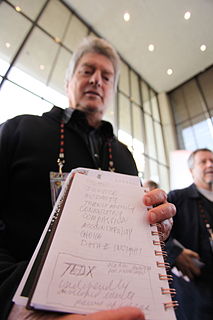A Quote by James Madison
The invasion of private rights is chiefly to be apprehended, not from acts of Government contrary to the sense of its constituents, but from acts in which the Government is the mere instrument of the major number of the Constituents.
Quote Topics
Related Quotes
Our country is too large to have all its affairs directed by a single government. Public servants at such a distance, and from under the eye of their constituents, must, from the circumstance of distance, be unable to administer and overlook all the details necessary for the good government of the citizens; and the same circumstance, by rendering detection impossible to their constituents, will invite public agents to corruption, plunder and waste.
It is self-evident that no number of men, by conspiring, and calling themselves a government, can acquire any rights whatever over other men, or other men's property, which they had not before, as individuals. And whenever any number of men, calling themselves a government, do anything to another man, or to his property, which they had no right to do as individuals, they thereby declare themselves trespassers, robbers, or murderers, according to the nature of their acts.
Most codes extend their definitions of treason to acts not really against one's country. They do not distinguish between acts against the government, and acts against the oppressions of the government. The latter are virtues, yet have furnished more victims to the executioner than the former. Real treasons are rare; oppressions frequent. The unsuccessful strugglers against tyranny have been the chief martyrs of treason laws in all countries.
The error seems not sufficiently eradicated, that the operations of the mind, as well as the acts of the body, are subject to the coercion of the laws. But our rulers can have authority over such natural rights only as we have submitted to them. The rights of conscience we never submitted, we could not submit. We are answerable for them to our God. The legitimate powers of government extend to such acts only as are injurious to others.
The Supreme Court consistently favors organized money and the political privileges of the corporate class. We have a Senate that is more responsive to affluent constituents than to middle-class constituents, while the opinions of constituents in the bottom third of income distribution have no apparent effect at all on the Senate's roll call votes.
[The purpose of a written constitution is] to bind up the several branches of government by certain laws, which, when they transgress, their acts shall become nullities; to render unnecessary an appeal to the people, or in other words a rebellion, on every infraction of their rights, on the peril that their acquiescence shall be construed into an intention to surrender those rights.






























